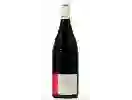
Château le PlaisirCairanne
In the mouth this red wine is a powerful with a nice balance between acidity and tannins.
This wine generally goes well with beef, game (deer, venison) or lamb.
Taste structure of the Cairanne from the Château le Plaisir
Light | Bold | |
Smooth | Tannic | |
Dry | Sweet | |
Soft | Acidic |
In the mouth the Cairanne of Château le Plaisir in the region of Rhone Valley is a powerful with a nice balance between acidity and tannins.
Food and wine pairings with Cairanne
Pairings that work perfectly with Cairanne
Original food and wine pairings with Cairanne
The Cairanne of Château le Plaisir matches generally quite well with dishes of beef, lamb or game (deer, venison) such as recipes of shoulder of suckling lamb confit with herbs, couscous merguez or duck breast with honey, potato and onion with garlic.
Details and technical informations about Château le Plaisir's Cairanne.
Discover the grape variety: Malvoisie de l' Istrie
This grape variety is endemic to the Istrian peninsula, which is partly located in Italy, Slovenia and Croatia, where it is the leading white grape variety. In France, it is almost unknown. It is related to malvasia bianca longa, also known as malvasia del Chianti.
Last vintages of this wine
The best vintages of Cairanne from Château le Plaisir are 2011
Informations about the Château le Plaisir
The Château le Plaisir is one of of the world's greatest estates. It offers 6 wines for sale in the of Cairanne to come and discover on site or to buy online.
The wine region of Cairanne
The wine region of Cairanne is located in the region of Rhône méridional of Rhone Valley of France. Wineries and vineyards like the Domaine Boutinot or the Domaine J. Boulard produce mainly wines red, white and pink. The most planted grape varieties in the region of Cairanne are Mourvèdre, Roussanne and Clairette, they are then used in wines in blends or as a single variety.
The wine region of Rhone Valley
The Rhone Valley is a key wine-producing region in Southeastern France. It follows the North-south course of the Rhône for nearly 240 km, from Lyon to the Rhône delta (Bouches-du-Rhône), near the Mediterranean coast. The Length of the valley means that Rhône wines are the product of a wide variety of soil types and mesoclimates. The viticultural areas of the region cover such a distance that there is a widely accepted division between its northern and southern parts.
The word of the wine: Hybrid
Term designating grape varieties obtained from two different vine species.














